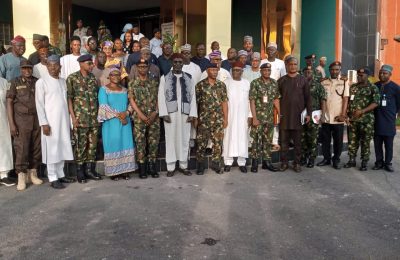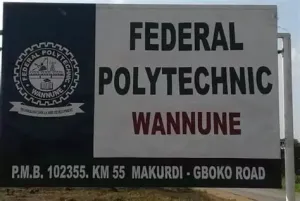

Hospitality Industry, Financial institutions and other service sectors that operate generators to power their operations for as long as between 15 – 18 hours daily would henceforth be closely watched by the National Environmental Standards and Regulatory Enforcement Agency (NESREA) to ensure they comply with lowest emission rate for clean environment, Minister of Environment, Mohammed Abdullahi has said.
Addressing participants at the Official Launch of the National Generator Emission (NGECP) and the National Vehicular Emission Control Programme (NVECP), Abdullahi in his keynote address said the campaign for a clean air intake by the population was a task for all Nigerians to undertake as the federal government through NESREA enforce the laws.
“For effective implementation of the programmes (NVECP and NGECP), you are all key in the process. Therefore, we are calling on all of you and the general public to join hands with NESREA in ensuring a cleaner and healthier environment for Nigerians.

“We all stand to benefit from the programmes, environmentally and economically but, we must first cultivate the seeds now so that we, as well as our future generations can reap the harvest.”
The launch, which had stakeholders from the sector in attendance, pointed out that the measure would reverse the various health challenges gaseous emissions causes to the Nigerian population who are forced to inhale dangerous gaseous content released into the atmosphere by these engines of vehicles and generators.
It would be recalled that this launch, comes up 9 years after it was first publicly announced in 2014 that NESREA was preparing to launch the National Vehicular Emission Control Programme by the then Former President, Dr Goodluck Ebele Jonathan Administration.

The extant Minister of Environment, Mohammed Abdullahi, reeled out statistics of the danger of the gaseous emissions from the fumes of vehicles and generator sets.

ALSO READ: President Buhari commissions $1.5bn Lekki Deep Seaport
“The air we breathe is one of the most important things around us, and it is a vital natural resource on which all life depends.
“Clean air is something that we all need for good health and the well-being of humans, animals, and plants. Sadly, our atmosphere is being continuously polluted.
“According to the World Health Organization (WHO) in the year 2016, ambient air pollution was responsible for 4.2 million deaths Worldwide, and it is estimated to cause about 16% of lung cancer deaths, 25% of chronic obstructive pulmonary disease (COPD), 17% of ischemic heart disease and stroke, and about 26% of respiratory infection deaths.
“This is in addition to the numerous environmental problems induced by air pollutants such as acid rain, ozone layer depletion, global warming, etc.
“Scientists predict that global temperatures are expected to continue to rise as a result of increased emissions of GHGs into the atmosphere, thus resulting in Global warming which affects weather patterns causing, among other problems, prolonged drought or increased flooding in some regions and ultimately brings about Climate change.
“As a result of the aforementioned, there is a clarion call for global action to combat air pollution, one of the greatest health and environmental challenges of our time.
“The call invites us all to consider how we can support action for clean air in our countries, cities and businesses, and make changes in our daily lives to reduce air pollution.
“These actions, in turn, benefit people’s health, protects ecosystems and reduce climate-warming air pollutants and greenhouse gases.
“It is worthy of mentioning that road transportation in Nigeria with over twelve million (12,000,000) vehicles flying the roads is playing a key role in the socio–economic development of the country.
“Unfortunately, despite significant advances in fuel efficiency and emission reductions, the transport sector remained one of the major sources of air pollution in Nigeria.
“Demand for electricity in Nigeria is currently increasing more above the supply from the national grid. A significant proportion of this shortfall is met with onsite generating sets (gensets) at consumer locations; some of these gensets operating between 15-18 hours a day (NBS, SMEDAN 2010).
“The market consists of gensets of varying quality and prices. Unfortunately, these diesel gensets contribute emissions of fine particulate matter (PM), including black carbon, which derives from the incomplete combustion of diesel (as occurs in many diesel gensets).
“The wide range and indiscriminate use of these generators for both domestic and industrial power supply, and the quantum of harmful pollutants such as Oxides of Nitrogen (NOX), Sulfur Dioxide (SO2), Carbon monoxide (CO), and partially unbent hydrocarbons emitted have contributed greatly to the poor air quality which negatively affects the environment and human health.”
He stated that the launch of the programme would address emissions for healthy nation his words:
“The two (2) programmes have been designed to address the emissions from mobile and stationary sources.
“The NGCP and the NVECP, are strategies aimed at cutting down emissions of pollutants from generators (stationary source) as well as vehicles (mobile source).
“The programmes would be implemented under the Public Private Partnership (PPP) and will involve periodic (annual) testing of the generators and vehicles for toxic and greenhouses gases emissions.
In this strategy, the responsibility of NESREA will be to set national emission standards and to develop a reliable national database management system for all emissions data generated from the two programmes (NVECP, and NGECP) in Nigeria.
“The implementation of the NGECP would be starting with power generating sets of capacity from 10 kva and above, while for NVECP the lowest limit would be Euro III emission standard as agreed at the ECOWAS regional level.”
According to Abdullahi, “As part of the NESREA mandate and to support the implementation of the Paris Agreement as spelled out in the Nationally Determined Contributions (NDC’s), the operationalization of the National Environmental (Control of Emissions from Petrol and Diesel Engines) Regulation 2011 and the National Environmental (Air Quality Control) Regulations, 2021 were scaled-up with two programmes.
“The National Vehicular Emissions Control Programme (NVECP) and National Generator Emissions Control Programme (NGECP).”
The Director General, National Environmental Standards and Regulatory Enforcement Agency (NESREA), Prof. Aliyu Jauro, said the launch of the programme would have human face using carrot and stick to ensure compliance for a healthy population and environment.
His words: “It entails sanction but it is step by step, we just launch it. The regulations that we have put in place, have provisions for some of these sanctions but when a vehicle fail a test, we give him time to go and fix it. There are technologies that are out in place for efficient combustions, when you fix it.
“Is going to cost you less, if you have efficient consumption it consumes less fuel and also it protects the environment and is a win-win situation.
“Is a multiplier effect, so really, you have a bad fuel it will emit dangerous fumes. We will start somewhere. There are regulatory bodies ensuring that we get quality fuel into the country if you are importing.
“So we are engaging with all of them to ensure that they bring in the right quality into the country and ensure all the emissions coming from these sources.
“On the standard of fuel to come into the country, there are different parameters. We have the Sulfur content which is usually taken into consideration like 50 ppm.”
On his part, the representative of the Directorate of the Vehicle Inspectorate Office, an Assistant Director, Awwal Nakata, said the programme would improve her enforcement task while on duty.
Another stakeholder who spoke on the programme, Executive secretary Joint Tax Board, Nana- Aisha Obomeghie said the programme would create employment that would take scavengers off the streets.








